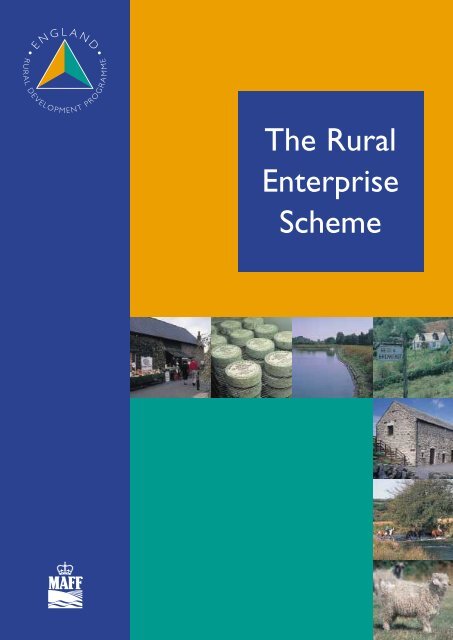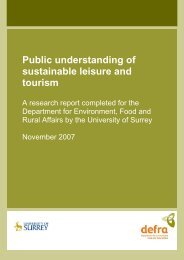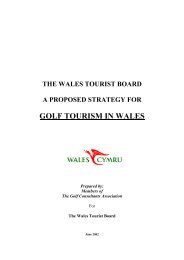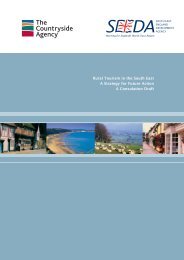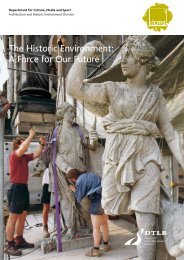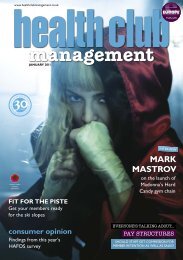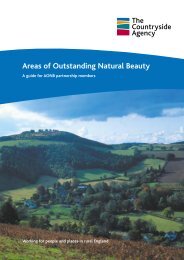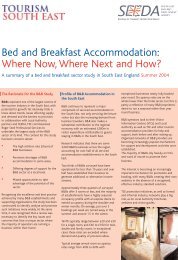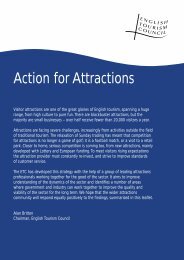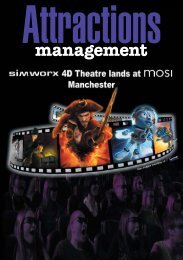What is the Rural Enterprise Scheme? - Tourisminsights.info
What is the Rural Enterprise Scheme? - Tourisminsights.info
What is the Rural Enterprise Scheme? - Tourisminsights.info
You also want an ePaper? Increase the reach of your titles
YUMPU automatically turns print PDFs into web optimized ePapers that Google loves.
The <strong>Rural</strong><br />
Enterpr<strong>is</strong>e<br />
<strong>Scheme</strong>
Th<strong>is</strong> booklet aims to answer your<br />
questions about <strong>the</strong> <strong>Rural</strong> Enterpr<strong>is</strong>e<br />
<strong>Scheme</strong> (RES) or point you to sources<br />
of more detailed <strong>info</strong>rmation.To guide<br />
you, <strong>the</strong> booklet covers <strong>the</strong> following<br />
most frequently asked questions:<br />
•<br />
<strong>What</strong> <strong>is</strong> <strong>the</strong> <strong>Rural</strong> Enterpr<strong>is</strong>e<br />
<strong>Scheme</strong>?<br />
•<br />
<strong>What</strong> types of projects can get<br />
funding under th<strong>is</strong> scheme?<br />
•<br />
Who can apply?<br />
•<br />
How much money <strong>is</strong> available?<br />
•<br />
How much money can I ask for?<br />
•<br />
Will I be able to receive help and<br />
funding for project development?<br />
•<br />
How do I apply for <strong>the</strong> <strong>Rural</strong><br />
Enterpr<strong>is</strong>e <strong>Scheme</strong>?<br />
•<br />
How are projects assessed?<br />
•<br />
Can MAFF help me with planning<br />
advice?<br />
•<br />
Can I also apply for grants under<br />
o<strong>the</strong>r England <strong>Rural</strong> Development<br />
Programme schemes? 1<br />
•<br />
How can I obtain more <strong>info</strong>rmation?<br />
<strong>What</strong> <strong>is</strong> <strong>the</strong> <strong>Rural</strong><br />
Enterpr<strong>is</strong>e <strong>Scheme</strong>?<br />
The <strong>Rural</strong> Enterpr<strong>is</strong>e <strong>Scheme</strong> (RES) <strong>is</strong> part of<br />
<strong>the</strong> England <strong>Rural</strong> Development Programme<br />
(ERDP) 2 . It provides ass<strong>is</strong>tance for projects<br />
that help to develop more sustainable,<br />
diversified and enterpr<strong>is</strong>ing rural economies<br />
and communities. Its coverage <strong>is</strong> wide-ranging<br />
but <strong>the</strong> primary aim <strong>is</strong> to help farmers adapt<br />
to changing markets and develop new<br />
business opportunities. RES also has a broader<br />
role in supporting <strong>the</strong> adaptation and<br />
development of <strong>the</strong> rural economy,<br />
community, heritage and environment.<br />
<strong>What</strong> types of projects<br />
can get funding under<br />
th<strong>is</strong> scheme?<br />
The scheme covers a very broad spectrum of<br />
potentially eligible activities, ranging from<br />
those designed to produce a commercial<br />
return, to those where <strong>the</strong> primary aim <strong>is</strong> to<br />
provide social and/or environmental benefits.<br />
Any project must fall within <strong>the</strong> categories<br />
covered by <strong>the</strong> European Union rules 3 under<br />
which <strong>the</strong> scheme has been dev<strong>is</strong>ed.The<br />
following l<strong>is</strong>t <strong>is</strong> a guide to help you identify<br />
<strong>the</strong> different areas covered by <strong>the</strong> scheme:<br />
•<br />
Setting up of farm relief and farm<br />
management services 4 .Th<strong>is</strong> could include<br />
<strong>the</strong> setting up or expanding of labour and/or<br />
machinery rings or o<strong>the</strong>r farm support<br />
services; milking, shepherding or<br />
environmental grazing services; farm<br />
management or secretarial support and farm<br />
relief to cover for farmers’ absences for<br />
training, holidays or o<strong>the</strong>r reasons.<br />
•<br />
Marketing of quality agricultural<br />
products i.e. those with identifiable quality<br />
attributes which ra<strong>is</strong>e <strong>the</strong> product above <strong>the</strong><br />
basic ‘commodity’ level.Th<strong>is</strong> could include<br />
projects to ra<strong>is</strong>e <strong>the</strong> quality of production to<br />
meet market needs, <strong>the</strong> formation or<br />
development of collaborative groups to<br />
market quality products, marketing of<br />
organic products, consumer and quality<br />
assurance schemes, speciality foods,<br />
establ<strong>is</strong>hing farmers’ markets, regional or<br />
local branding of foodstuffs, etc.<br />
•<br />
Basic services for <strong>the</strong> rural economy<br />
and population. Th<strong>is</strong> could involve pumppriming<br />
projects designed to support local<br />
communities and <strong>the</strong> rural economy and<br />
local population such as minibus links,<br />
voluntary carer or ‘out of school’ childcare<br />
schemes, <strong>info</strong>rmation and communication<br />
technology links and o<strong>the</strong>r types of<br />
infrastructure for d<strong>is</strong>persed rural<br />
communities.<br />
•<br />
Renovation and development of<br />
villages and protection and<br />
conservation of <strong>the</strong> rural heritage. Th<strong>is</strong><br />
could include projects that promote <strong>the</strong><br />
revival or expansion of local art<strong>is</strong>an crafts<br />
(thatching, stone masonry, wood carving,<br />
hedge-laying, etc), village museums, access to<br />
h<strong>is</strong>torical features and landscapes and <strong>the</strong><br />
renovation of h<strong>is</strong>toric village buildings.<br />
•<br />
Diversification of agricultural activities<br />
and activities close to agriculture to<br />
provide multiple activities or<br />
alternative incomes. Th<strong>is</strong> could include<br />
<strong>the</strong> production and marketing of new or<br />
non-mainstream crops or livestock products,<br />
or <strong>the</strong> conversion of agricultural buildings to<br />
new non-agricultural uses and non-farming<br />
activities on <strong>the</strong> farm.<br />
•<br />
Agricultural water resources<br />
management. Th<strong>is</strong> could include projects<br />
aimed at improving <strong>the</strong> management of<br />
<strong>the</strong>se resources through, for example, <strong>the</strong><br />
construction of water storage facilities and<br />
associated equipment.<br />
2<br />
3
•<br />
Development and improvement of<br />
infrastructure connected with <strong>the</strong><br />
development of agriculture. Th<strong>is</strong> could<br />
include local infrastructure projects designed<br />
to benefit agriculture, such as <strong>the</strong> prov<strong>is</strong>ion<br />
or upgrading of access roads or bridges, and<br />
<strong>the</strong> prov<strong>is</strong>ion of local energy or<br />
technological infrastructures.<br />
•<br />
Encouragement for tour<strong>is</strong>t and craft<br />
activities. Projects could include <strong>the</strong><br />
marketing and promotion of local tour<strong>is</strong>t<br />
initiatives, upgrading accommodation,<br />
facilities for on-farm tour<strong>is</strong>t activities and<br />
craft activities and links to local food<br />
catering.<br />
•<br />
Protection of <strong>the</strong> environment in<br />
connection with agriculture, forestry<br />
and landscape conservation as well as<br />
with <strong>the</strong> improvement of animal<br />
welfare. Especially projects designed in<br />
terms of producing or sustaining a<br />
commercial enterpr<strong>is</strong>e which, for example,<br />
enhances country le<strong>is</strong>ure pursuits.<br />
MAFF will be providing fur<strong>the</strong>r advice on<br />
diversification in a guide publ<strong>is</strong>hed to<br />
complement th<strong>is</strong> scheme.We also want to<br />
encourage innovation, however, and <strong>the</strong><br />
scheme <strong>is</strong> not intended to be prescriptive.<br />
Collaborative projects are particularly<br />
welcome as are projects developed by local<br />
groups of mixed interests and projects using a<br />
range of RES activities or combined with<br />
o<strong>the</strong>r ERDP schemes.<br />
Your project will be assessed and<br />
admin<strong>is</strong>tered on a regional bas<strong>is</strong>. It will<br />
<strong>the</strong>refore need to fit in with regionally<br />
determined priorities. Details of <strong>the</strong>se<br />
priorities can be found in <strong>the</strong> regional<br />
chapters of <strong>the</strong> ERDP or from your local<br />
MAFF office.<br />
Your project should be sustainable and should<br />
not have any negative impact on <strong>the</strong><br />
environment and must respect all current<br />
environmental, hygiene and animal welfare<br />
leg<strong>is</strong>lation.You will not receive a grant purely<br />
in order for you to meet statutory<br />
requirements.<br />
Who can apply?<br />
While help for farmers <strong>is</strong> a primary aim, you<br />
do not have to be a farmer to benefit from<br />
<strong>the</strong> scheme: a range of o<strong>the</strong>r rural businesses<br />
(partnerships and companies) and rural<br />
community groups will also be able to receive<br />
funding.The final beneficiaries of th<strong>is</strong> grant aid,<br />
however, must be non-public sector<br />
organ<strong>is</strong>ations. Support may also be given to<br />
bodies which promote and co-ordinate<br />
multiple applications related to a specific<br />
<strong>the</strong>me, sector, or area.<br />
The scheme <strong>is</strong> available throughout England,<br />
except designated Objective 1 areas, where<br />
separate funding schemes apply 5 .A particular<br />
target for aid will be projects which benefit<br />
designated EU Objective 2 rural areas, to<br />
reflect <strong>the</strong>ir special need for ass<strong>is</strong>tance within<br />
<strong>the</strong> EU context. Your local MAFF office will<br />
be able to tell you whe<strong>the</strong>r you are located in<br />
an Objective 1 or 2 area.<br />
How much money <strong>is</strong><br />
available?<br />
A total of £152 million EU and Government<br />
money has been allocated to <strong>the</strong> RES for <strong>the</strong><br />
period April 2001 to <strong>the</strong> end of 2006.The<br />
majority of <strong>the</strong> funding has been allocated to<br />
regional budgets.A small proportion has been<br />
reserved for national projects on <strong>the</strong><br />
marketing of quality agricultural products.<br />
How much money can I<br />
ask for?<br />
There <strong>is</strong> no fixed rate of aid. Instead <strong>the</strong>re are<br />
three bands of aid depending on <strong>the</strong> extent of<br />
any commercial return from your project.You<br />
must bid for <strong>the</strong> level of funding, within <strong>the</strong>se<br />
bands, that you judge necessary for <strong>the</strong><br />
project to proceed. There <strong>is</strong> no maximum or<br />
minimum project size although if your project<br />
involves diversification into alternative<br />
agricultural activities, <strong>the</strong> maximum ERDP<br />
investment per holding <strong>is</strong> £500, 000. 6<br />
For projects which have a minimal economic<br />
return to <strong>the</strong> applicant (i.e. a project that<br />
principally benefits <strong>the</strong> local community or<br />
environment), <strong>the</strong> total public funding as a<br />
percentage of <strong>the</strong> total eligible costs of <strong>the</strong><br />
project may be between 50 and 100 7 per cent.<br />
For projects where an economic return to<br />
<strong>the</strong> applicant <strong>is</strong> <strong>the</strong> primary objective of<br />
a project, <strong>the</strong> total public funding as a<br />
percentage of <strong>the</strong> total eligible costs of <strong>the</strong><br />
project may be between 30 and 50 per cent.<br />
For projects generating a substantial<br />
economic return to <strong>the</strong> applicant (i.e. an<br />
annual return in excess of 25 per cent of <strong>the</strong><br />
total investment), <strong>the</strong> total public funding as a<br />
percentage of <strong>the</strong> total eligible costs of <strong>the</strong><br />
project may be between 15 and 30 per cent.<br />
Will I be able to receive<br />
help and funding for<br />
project development?<br />
You may well feel that you need help<br />
developing your project idea, especially if it <strong>is</strong><br />
a large or complex initiative.Th<strong>is</strong> process <strong>is</strong><br />
commonly known as “facilitation”. Reasonable<br />
costs associated with project development<br />
(e.g. feasibility studies, development work,<br />
preparation of a business case, etc.) are<br />
eligible for funding under RES.You will need to<br />
decide whe<strong>the</strong>r to do th<strong>is</strong> as ei<strong>the</strong>r a part of<br />
an approved project (up to 10 per cent of<br />
total project costs) or as a preliminary<br />
project in its own right.<br />
4<br />
5
How do I apply for <strong>the</strong><br />
<strong>Rural</strong> Enterpr<strong>is</strong>e<br />
<strong>Scheme</strong>?<br />
You will need to complete <strong>the</strong> standard ERDP<br />
application form (ERDP/GEN1), if you have<br />
not already done so, toge<strong>the</strong>r with <strong>the</strong> RES<br />
supplement (ERDP/RES1).These will need to<br />
be accompanied by a suitably detailed business<br />
plan or project proposal setting out, for<br />
example, what you intend doing, what <strong>the</strong><br />
benefits will be, costings and proposed<br />
public/private funding arrangements, outputs<br />
and additional supporting details.Applications<br />
can be submitted at any time; <strong>the</strong>re <strong>is</strong> no<br />
application window. National projects for <strong>the</strong><br />
marketing of quality agricultural products<br />
should be sent to MAFF HQ in London 8 .<br />
Fur<strong>the</strong>r <strong>info</strong>rmation about <strong>the</strong> application<br />
process <strong>is</strong> available and can be obtained from<br />
your local MAFF office.<br />
How are projects<br />
assessed?<br />
After an initial eligibility check, regional MAFF<br />
and Farming and <strong>Rural</strong> Conservation Agency<br />
(FRCA) staff will carry out a detailed<br />
assessment of each application and draw up<br />
an assessment report.They may need to talk<br />
to you about <strong>the</strong> project, especially if <strong>the</strong>y feel<br />
that additional supporting <strong>info</strong>rmation would<br />
benefit your application.<br />
Your project will be assessed against a range<br />
of criteria: <strong>the</strong> need for <strong>the</strong> project; <strong>the</strong><br />
project’s outputs; sustainability of <strong>the</strong> project<br />
in terms of <strong>the</strong> economic, environmental and<br />
social impacts; its contribution to wider policy<br />
objectives; financial viability and r<strong>is</strong>k; <strong>the</strong><br />
specific need for public funding; plans for<br />
management and delivery of <strong>the</strong> project; r<strong>is</strong>k<br />
assessment; compatibility with regional<br />
priorities; and value for money.<br />
Your application will <strong>the</strong>n be considered, on<br />
<strong>the</strong> bas<strong>is</strong> of <strong>the</strong> assessment report, by a<br />
Regional Appra<strong>is</strong>al Panel, cons<strong>is</strong>ting of a senior<br />
MAFF member of staff, a senior FRCA<br />
member of staff and a Government Office<br />
representative or nominee.Th<strong>is</strong> group will<br />
normally meet quarterly. If your project <strong>is</strong><br />
approved, you will be sent an Offer Letter.Th<strong>is</strong><br />
will set out details such as <strong>the</strong> targets to be<br />
met and time periods within which<br />
expenditure must be incurred and claims made<br />
to MAFF. You must remember that funding will<br />
only be granted in respect of costs incurred<br />
after a project application has been approved.<br />
Separate but similar procedures will apply for<br />
national projects on <strong>the</strong> marketing of quality<br />
agricultural products, which will be assessed at<br />
MAFF HQ.<br />
If your project <strong>is</strong> rejected, you will be given<br />
<strong>the</strong> reasons why. In some cases we may<br />
suggest that you improve and re-submit your<br />
application.<br />
Can MAFF help me with<br />
planning advice?<br />
In addition to ex<strong>is</strong>ting sources of advice, MAFF <strong>is</strong><br />
offering free planning consultancy advice for<br />
sound RES farm diversification projects which<br />
require planning perm<strong>is</strong>sion.Th<strong>is</strong> was announced<br />
by <strong>the</strong> Prime Min<strong>is</strong>ter in h<strong>is</strong> Action Plan for<br />
Farming, on 30 March 2000.You can obtain<br />
fur<strong>the</strong>r details in <strong>the</strong> full scheme documentation<br />
available from your local MAFF office.<br />
Can I also apply for<br />
grants under o<strong>the</strong>r<br />
ERDP schemes?<br />
Projects which link with o<strong>the</strong>r public grant<br />
schemes are welcomed.You can, for example,<br />
apply for funding from one of <strong>the</strong> o<strong>the</strong>r ERDP<br />
schemes 9 in conjunction with your RES<br />
application. Indeed certain projects may<br />
require action under two or more of <strong>the</strong><br />
schemes if <strong>the</strong> full potential of <strong>the</strong> project as a<br />
whole <strong>is</strong> to be achieved.You can also link your<br />
application with funding from o<strong>the</strong>r sources<br />
although you cannot receive funds from two<br />
different sources in respect of <strong>the</strong> same<br />
expenditure.<br />
How can I obtain more<br />
<strong>info</strong>rmation?<br />
Please contact your local MAFF office.<br />
References<br />
1 The o<strong>the</strong>r ERDP schemes are: Environmentally<br />
Sensitive Areas <strong>Scheme</strong>, Countryside<br />
Stewardship <strong>Scheme</strong>, Organic Farming<br />
<strong>Scheme</strong>,Woodland Grant <strong>Scheme</strong>, Farm<br />
Woodland Premium <strong>Scheme</strong>, Hill Farm<br />
Allowance, Processing & Marketing Grant,<br />
Energy Crops <strong>Scheme</strong>,Vocational Training<br />
<strong>Scheme</strong>.<br />
2 The England <strong>Rural</strong> Development Programme<br />
<strong>is</strong> a family of schemes jointly funded by<br />
Government and <strong>the</strong> EU which <strong>is</strong> designed to<br />
support schemes to protect and improve <strong>the</strong><br />
countryside and to encourage sustainable<br />
enterpr<strong>is</strong>e and thriving rural communities.<br />
3 Articles 4 and 33 of Council Regulation<br />
1257/99 publ<strong>is</strong>hed in Official Journal L160<br />
(pages 80-101), on 26 June 1999.<br />
4 Bold type reflects <strong>the</strong> specific measures<br />
referred to in Council Regulation 1257/99.<br />
5 Cornwall and <strong>the</strong> Scilly Isles, Merseyside and<br />
South Yorkshire.<br />
6 Th<strong>is</strong> maximum sum includes any grants for<br />
planting m<strong>is</strong>canthus under <strong>the</strong> Energy Crops<br />
<strong>Scheme</strong>.<br />
7 100% of project costs would only be provided<br />
in very exceptional circumstances.<br />
8 Marketing, Competition and Consumers Div<strong>is</strong>ion<br />
Room 21<br />
MAFF<br />
10 Whitehall Place<br />
London<br />
SWIA 2HH<br />
9 See footnote 1.<br />
6<br />
7
www.maff.gov.uk<br />
MAFF Publications<br />
Admail 6000, Leicester SW1A 2XX<br />
Tel: 08459 556000<br />
PB No. 5267 © Crown Copyright 2000<br />
Photo credits<br />
Reservoir:ADAS<br />
Bed & breakfast: Britain on View<br />
Horse riding: Holt Studios/Sarah Rowland<br />
Lavender: Holt Studios/Jurgen Dielenschneider


